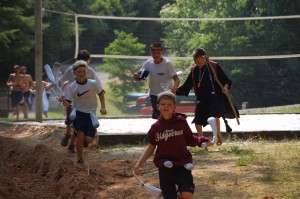A Parent’s Primer on Internet Pornography
Posted by PhilYou may think that you already have a good grip on this somewhat uncomfortable topic. As a youth development professional, I strongly encourage you to take a few short minutes to check out this simple article with plenty of optional additional resources. We want you to be equipped…
“The Internet, mobile devices, and other digital technologies combine to create a world in which children and teens no longer have to look for and find pornography. Now, pornography is in the mainstream and it finds them.
As parents called by God to nurture our children through childhood and into a spiritually healthy adulthood, we have the responsibility to be keenly aware of pornography’s presence, its compelling draw, and the impact it has on our kids. When it comes to pornography, what they see and experience now will not only shape them in the present, but will continue to influence them and their relationships for the rest of their lives. Consequently, we must be diligent in preparing our children to understand, process, and respond to this horribly fallen expression of God’s good gift of sexuality in ways that bring honor and glory to God.”
Read more from Walt Mueller’s article.
Phil Berry
Assistant Director, Camp Ridgecrest for Boys
www.ridgecrestcamps.com
Posted in Just For Parents | Tagged Camp Crestridge, Camp Parents, Camp Ridgecrest, parent articles, parent resources, Ridgecrest Summer Camps | Leave a reply
6 Reasons Young Christians Leave Church
Posted by Phil Here at Ridgecrest Summer Camps, we want to partner with you as the parent of these young men and women that we have grown to love here at Camp. During their 2+ weeks they spend with us lots of cool things happen. We get to see them grow in awesome ways. And when they go home, back into the real world, the pressures and difficult influences will always be there. We know that having a Church with a group of other young believers to walk through life with them is crucial. So, it’s hard when we hear stories of kids giving up on Church…
Here at Ridgecrest Summer Camps, we want to partner with you as the parent of these young men and women that we have grown to love here at Camp. During their 2+ weeks they spend with us lots of cool things happen. We get to see them grow in awesome ways. And when they go home, back into the real world, the pressures and difficult influences will always be there. We know that having a Church with a group of other young believers to walk through life with them is crucial. So, it’s hard when we hear stories of kids giving up on Church…
Below is an interesting article that I ran across recently put out by the Barna Group. It’s worth the quick read, even if you don’t agree with all of it.
_____________________________________________
Many parents and church leaders wonder how to most effectively cultivate durable faith in the lives of young people. A five-year project headed by Barna Group president David Kinnaman explores the opportunities and challenges of faith development among teens and young adults within a rapidly shifting culture. The findings of the research are included in a new book by Kinnaman titled You Lost Me: Why Young Christians are Leaving Church and Rethinking Church.
The research project was comprised of eight national studies, including interviews with teenagers, young adults, parents, youth pastors, and senior pastors. The study of young adults focused on those who were regular churchgoers Christian church during their teen years and explored their reasons for disconnection from church life after age 15.
No single reason dominated the break-up between church and young adults. Instead, a variety of reasons emerged. Overall, the research uncovered six significant themes why nearly three out of every five young Christians (59%) disconnect either permanently or for an extended period of time from church life after age 15.
Reason #1 – Churches seem overprotective.
A few of the defining characteristics of today’s teens and young adults are their unprecedented access to ideas and worldviews as well as their prodigious consumption of popular culture. As Christians, they express the desire for their faith in Christ to connect to the world they live in. However, much of their experience of Christianity feels stifling, fear-based and risk-averse. One-quarter of 18- to 29-year-olds said “Christians demonize everything outside of the church” (23% indicated this “completely” or “mostly” describes their experience). Other perceptions in this category include “church ignoring the problems of the real world” (22%) and “my church is too concerned that movies, music, and video games are harmful” (18%).
Reason #2 – Teens’ and twentysomethings’ experience of Christianity is shallow.
A second reason that young people depart church as young adults is that something is lacking in their experience of church. One-third said “church is boring” (31%). One-quarter of these young adults said that “faith is not relevant to my career or interests” (24%) or that “the Bible is not taught clearly or often enough” (23%). Sadly, one-fifth of these young adults who attended a church as a teenager said that “God seems missing from my experience of church” (20%).
Reason #3 – Churches come across as antagonistic to science.
One of the reasons young adults feel disconnected from church or from faith is the tension they feel between Christianity and science. The most common of the perceptions in this arena is “Christians are too confident they know all the answers” (35%). Three out of ten young adults with a Christian background feel that “churches are out of step with the scientific world we live in” (29%). Another one-quarter embrace the perception that “Christianity is anti-science” (25%). And nearly the same proportion (23%) said they have “been turned off by the creation-versus-evolution debate.” Furthermore, the research shows that many science-minded young Christians are struggling to find ways of staying faithful to their beliefs and to their professional calling in science-related industries.
Reason #4 – Young Christians’ church experiences related to sexuality are often simplistic, judgmental.
With unfettered access to digital pornography and immersed in a culture that values hyper-sexuality over wholeness, teen and twentysometing Christians are struggling with how to live meaningful lives in terms of sex and sexuality. One of the significant tensions for many young believers is how to live up to the church’s expectations of chastity and sexual purity in this culture, especially as the age of first marriage is now commonly delayed to the late twenties. Research indicates that most young Christians are as sexually active as their non-Christian peers, even though they are more conservative in their attitudes about sexuality. One-sixth of young Christians (17%) said they “have made mistakes and feel judged in church because of them.” The issue of sexuality is particularly salient among 18- to 29-year-old Catholics, among whom two out of five (40%) said the church’s “teachings on sexuality and birth control are out of date.”
Reason #5 – They wrestle with the exclusive nature of Christianity.
Younger Americans have been shaped by a culture that esteems open-mindedness, tolerance and acceptance. Today’s youth and young adults also are the most eclectic generation in American history in terms of race, ethnicity, sexuality, religion, technological tools and sources of authority. Most young adults want to find areas of common ground with each other, sometimes even if that means glossing over real differences. Three out of ten young Christians (29%) said “churches are afraid of the beliefs of other faiths” and an identical proportion felt they are “forced to choose between my faith and my friends.” One-fifth of young adults with a Christian background said “church is like a country club, only for insiders” (22%).
Reason #6 – The church feels unfriendly to those who doubt.
Young adults with Christian experience say the church is not a place that allows them to express doubts. They do not feel safe admitting that sometimes Christianity does not make sense. In addition, many feel that the church’s response to doubt is trivial. Some of the perceptions in this regard include not being able “to ask my most pressing life questions in church” (36%) and having “significant intellectual doubts about my faith” (23%). In a related theme of how churches struggle to help young adults who feel marginalized, about one out of every six young adults with a Christian background said their faith “does not help with depression or other emotional problems” they experience (18%).
Read the rest of the article here…
I’m not making an argument that these finding are 100% correct. But hearing their perspective only helps me relate to young Christian men and women.
Posted in Just For Parents | Tagged Camp Crestridge, Camp Ridgecrest, parent resources, Parenting Teenagers, Ridgcrest Summer Camps | Leave a reply
Allowing Teenage Boys to Love Their Friends
Posted by Phil As a youth development professional at Ridgecrest Summer Camps who spends most of his time focusing on the growth of boys into young men, this is an interesting article that any mom with a son should read. There are a number of points that I can relate to, as well as examples that I have seen over and over again in my career. This article was published in the New York Times, written by Jan Hoffman.
As a youth development professional at Ridgecrest Summer Camps who spends most of his time focusing on the growth of boys into young men, this is an interesting article that any mom with a son should read. There are a number of points that I can relate to, as well as examples that I have seen over and over again in my career. This article was published in the New York Times, written by Jan Hoffman.
Posted in Just For Parents | Tagged Camp Crestridge, Camp Ridgecrest, parent resources, parenting boys, Parenting Teenagers, Ridgecrest Summer Camps | Leave a reply
Moms that Pray
Posted by Phil The longer I work for Ridgecrest Summer Camps, the longer I realize how crucial prayer is for our campers. We pray for them almost ever day of the year. I love that.
The longer I work for Ridgecrest Summer Camps, the longer I realize how crucial prayer is for our campers. We pray for them almost ever day of the year. I love that.
I know that many of you have heard of Moms in Touch. Some of you may not know anything about them. That’s ok. But I’m learning more about them, as my wife may begin to lead a group of moms at our local Primary School. While there is a lot that I don’t know about them yet, here is what I do know.
They pray. I mean they really pray. It’s guided…not fly by the seat of your pants, but intentional.
It’s not just a social hour. These moms get down to business. Why? Because they believe in it. They believe that seeking Jesus with our hopes and desires is a real thing.
If you want someone to pray about anything, then let them know. They will pray!
I realize that every Moms in Touch group may be different, and I really only know details about 2 groups. But if you are looking for a group of moms who want to put their children, their school and their community before the Lord in prayer, then this is a good place to start.
Posted in Just For Parents | Tagged Camp Crestridge, Camp Moms, Camp Ridgecrest, Christian Camps, parent resources, Ridgcrest Summer Camps | Leave a reply
My parents don’t trust me
Posted by Phil This is an interesting exchange between a teenager speaking on behalf of other teens and a parent who is also a counselor.They are discussing the issue of parents trusting their kids… Check it out…
This is an interesting exchange between a teenager speaking on behalf of other teens and a parent who is also a counselor.They are discussing the issue of parents trusting their kids… Check it out…
“Hi. I’m John, and thanks for coming to this site. I hope you are ready to hear some things about an important area of our lives — how we get along with our parents when they don’t seem to trust us.
Almost every teenager in the world at one time or another has felt like his parents don’t trust him. I have had that feeling since the sixth grade! My parents are neat people. But when I feel distrusted, I need help. When I am the one caught in the crunch, I need some answers.
That’s the whole idea behind this web site: it’s for teenagers like you and me to be able to hear someone who can help with our everyday questions and problems.
There is someone I would like for you to meet who is qualified on this subject from two standpoints. He is a parent. He has had two teenagers of his own. And he has admitted that there have been some times when he had to deal with this question of trust in his home.
His name is Pat Clendinning. He is a professional counselor who talks with parents and youth about their relationships. And I believe he can help us think through some of these issues.
Pat, I get so confused sometimes as to what part of this is my imagination and what part of it is real. And if it is real, is it my parents’ imagination, or do they have a legitimate complaint? Does that make sense?
Pat: I think all of those possibilities are real from time to time, John. Maybe you think they don’t trust you when that is really not the case. But there is no doubt that there are times when they probably don’t. Right or wrong, they just don’t trust you.
John: Sometimes I know I have done something that caused them not to trust me, but there are also times when I don’t think I have done anything at all and I feel like they are not trusting me. It might be good to know some of the legitimate causes of parents not trusting their kids.
Pat: I think this is one you could answer for yourself. Tell me what issues of trust really bother you.”
Read more of this article by Pat Clendinning
Posted in Just For Parents | Tagged Camp Creast, Camp Moms, Camp Ridgecrest, parent resources, Parenting Teenagers, Ridgecrest Summer Camps | Leave a reply
Reduce parent-teen conflict
Posted by Phil Children are not born with instructions. Even if they were, I doubt that many parents would actually read the directions. Most parents, like me, learn from experience. The following four pointers are some principles I’ve used to reduce the parent/teen conflict in my own home and to increase my teen’s involvement in making responsible choices.
Children are not born with instructions. Even if they were, I doubt that many parents would actually read the directions. Most parents, like me, learn from experience. The following four pointers are some principles I’ve used to reduce the parent/teen conflict in my own home and to increase my teen’s involvement in making responsible choices.
Realize your own needs
of teenagers are usually approaching an age of reflection, and this mid-life stage can be a time of personal crisis! Parenting a teen can add to the intensity, as you must face your own issues and those of a budding son or daughter. As a parent, you must come to terms with your own emotions and not transfer these to the challenges of parenting.
Respond productively to emotions
Teens are a bundle of emotions, but never discount the vital role of these emotions. Emotions are at the surface, but they offer parents an open line of communication with their teens. This time can assist you in better understanding your teen’s deeper feelings and thoughts.
Too often, parents discount how seriously their teens desire their opinions. Find out what your teen feels is the source of his emotions and talk about it. The source may be real or imagined, but it is serious to him. Choose one meal each day when the family can gather to talk. Use it to build a lasting family tradition.
Focus on positive behaviors
Conflicts and disagreements offer an opportunity for parents to help their teen talk through a time of difficulty. This can be a teachable moment for your teen, other siblings, and yourself. They will expect you to criticize what’s wrong, so asking questions and listening can catch a teen off-guard.
A turning point in my own life was when I knew my actions deserved punishment, but my dad responded calmly. We talked through my choices and the natural consequences that would result. This became a defining moment in my own life!
Develop a plan of action
Teens have adult bodies with a child’s experience. As a result, they may struggle with knowing how to act on their feelings. The following gives you a way for your teenager to be a partner in developing a plan that you both can agree upon.
Compromise can be a dirty word in theology, but it’s critical in relationships. Parents can move their children toward adulthood by allowing them to negotiate some house rules. This means teaching them to make appropriate choices and weighing rewards and punishments.
Within your expectations, consider what is negotiable: curfews, cell phones, car keys, and so forth. Encourage your teen to begin by praying and to list their wants. You must then explain what you expect. As you talk with your teen, offer possible alternatives and list the punishments for violating the rules.
Once an agreement is reached, put it in writing – signed and dated. This simple exercise can increase communication and reduce conflict.
The front porch may be gone, but the need to talk continues. Allow your experiences and an emphasis on consequences guide you as you guide your teen. Before you know it, you just might have a mature young adult on your hands.
by Dr. Larry Purcell on Tuesday, November 13, 2007
Posted in Just For Parents | Tagged Camp Crestridge, Camp Moms, Camp Ridgecrest, parent resources, Parenting Teenagers, Ridgecrest Summer Camps | Leave a reply
Are my kids “self-reliant?”
Posted by Phil
 At the risk of sounding a bit political, I thought I would share some thoughts on the Occupy Wall Street movement. While I sympathize with people that are down on their luck, those that don’t have job, and those that are struggling to make ends meet, I don’t think that the answer is to blame Wall Street, or to expect our federal government to give continuous handouts to anyone and everyone. I believe the “handout” role should be filled by our churches and charitable organizations for the most part, at the community level. Whenever things happen at the federal level, there is a greater opportunity for mismanagement and corruption.
At the risk of sounding a bit political, I thought I would share some thoughts on the Occupy Wall Street movement. While I sympathize with people that are down on their luck, those that don’t have job, and those that are struggling to make ends meet, I don’t think that the answer is to blame Wall Street, or to expect our federal government to give continuous handouts to anyone and everyone. I believe the “handout” role should be filled by our churches and charitable organizations for the most part, at the community level. Whenever things happen at the federal level, there is a greater opportunity for mismanagement and corruption.Posted in Just For Parents | Tagged Camp Crestridge, Camp Ridgecrest, parent resources, Parenting Teenagers, Ridgecrest Summer Camps | Leave a reply
Standing in the Gap
Posted by Phil I’ve worked closely with teenagers for the past 11 years. I have considered it my job to know and understand teenagers the best I can. Perhaps the best way to do that, in my opinion, is to be with them. Most would agree that it’s hard to understand a culture that you are not a part of. You can study it, read books about it (or articles like this one), hear first hand accounts of it, and still not have a clear understanding of why things are the way they are. You have to actually be a part of the culture, live with them, experience what they experience, listen to what they listen to, see what they see, and show up in their space….if you want to actually understand them. I considered it a privilege to get to be a part of this culture for many years!
I’ve worked closely with teenagers for the past 11 years. I have considered it my job to know and understand teenagers the best I can. Perhaps the best way to do that, in my opinion, is to be with them. Most would agree that it’s hard to understand a culture that you are not a part of. You can study it, read books about it (or articles like this one), hear first hand accounts of it, and still not have a clear understanding of why things are the way they are. You have to actually be a part of the culture, live with them, experience what they experience, listen to what they listen to, see what they see, and show up in their space….if you want to actually understand them. I considered it a privilege to get to be a part of this culture for many years!
The Parent Factor
Here’s the problem. Eventually, as a parent, you experience that separation from your teenager. You feel as if you can’t show up in their space as you once did, or you will be crowding them. They stop telling you everything. You stop understanding their jokes. And you find yourself missing out, and not a part of their culture anymore. Yes, this is hard.
First, never stop pursuing your kids! Continue to show up in their life and communicate that you love them no matter what they do. When nothing else works, keep showing up.
Standing in the gap
We pray for another caring adult. I am a huge believer in praying for another caring adult who can come along side your teenager. Another follower of Jesus, who can earn the right to be heard by your child. Through shared experiences, this young (or old) adult can break through barriers that seem impossible for a parent. Somehow its just different. Some of you are lucky enough to have incredibly open relationships with your teens. Even for you, the value of these other non-parent relationships with your child is enormous. Pray for these people as they walk along side your child in some of the most difficult years of their life. And remember, as great a relationship as these other folks can have with your babies…they will never replace you as a parent. That is a role just for you.
Be thankful for your youth leaders at your church, or your YoungLife and WyldLife leaders, or even your camp counselors. The Lord uses them in great ways! More than anything else, pray for them and support them. Pray for wisdom and for favor in the eyes of the teenagers they work with…
And while you pray, never stop pursuing your kids and showing up in their space, at their practices, at their games, where they work, wherever they are…
Where do you show up in your child’s space? How do you support them and love them by “just showing up?” Share your thoughts or stories below…
Phil Berry
Camp Director, YoungLife leader and Father
Posted in Just For Parents | Tagged Camp Crestridge, Camp Moms, Camp Ridgecrest, Christian Camps, parent resources, Parenting Teenagers, Ridgecrest Summer Camps | Leave a reply
Strength in Numbers – Moms!
Posted by Phil Have you ever thought, I wonder if other moms feel …? However you finish that sentence, the answer is yes. The journey of motherhood is exciting, scary, lovely, and challenging. Which is why we’ve created .MOM—a weekend that will encourage and refresh you, connect you with other moms, celebrate motherhood, and draw you closer to Christ.
Have you ever thought, I wonder if other moms feel …? However you finish that sentence, the answer is yes. The journey of motherhood is exciting, scary, lovely, and challenging. Which is why we’ve created .MOM—a weekend that will encourage and refresh you, connect you with other moms, celebrate motherhood, and draw you closer to Christ.
An event designed for you…Sept 23-24th…
Posted in Just For Parents | Tagged .Mom Event, Camp Crestridge, Camp Ridgecrest, parent resources, Ridgecrest Summer Camps | Leave a reply
It Starts When You’re Young
Posted by SharonWhen I was growing up, my parents were more concerned with being able to put food on the table, not necessarily feeding my brothers and I the most healthy food. Throughout college and the first couple years I lived on my own, I ate whatever was easy to make and least expensive because that’s how I was raised. I am realizing that how I was raised plays a huge role in how I act today.
I am currently taking an EMT (Emergency Medical Technician) class to add another level of medical care at camp. While studying Anatomy, Physiology, and Cardiac problems, I realized how important it is to eat healthy and exercise. The most important thing I’ve learned about Cardiac problems is that you can’t just start taking care of your heart when you are middle-aged. You can’t reverse the plaque build up in your arteries. It starts when you’re young! That is why it is so important to make sure your kids are eating healthy and exercising when they are young. They will continue those habits as they grow older because that is how they were raised. Doesn’t this concept apply to other areas of life? What about their friendships and relationships with the opposite sex? How about time management if they are involved in extracurricular activities?
We focus on four areas of growth at camp-spiritual, social, mental, and physical. We challenge our campers to be active at camp. Your kids get to run around, go swimming, hiking, make forts, and do activities they typically don’t get to do at home. We want to show them that exercising is fun especially when you do it in different forms like those just listed.
What activities do you do as a family? How often are you outside with your kids? How has your childhood affected who you are today?
Sharon Aylestock
Assistant Director, Camp Crestridge
Posted in Just For Parents | Tagged Camp Crestridge, Camp Ridgecrest, Christian Camping, Just for Parents, parent resources, Ridgecrest Summer Camps | Leave a reply


